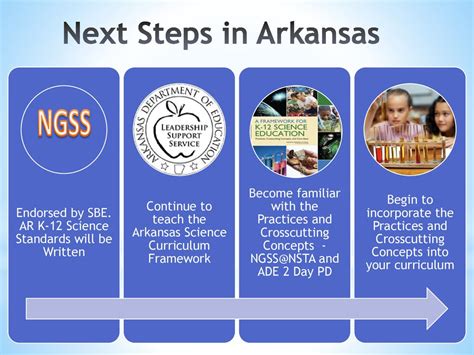Introduction
The Arkansas Science Standards, adopted in 2019, provide a comprehensive framework for science education in the state from kindergarten through high school. These standards are aligned with national and international benchmarks and are designed to prepare students for success in college, careers, and life in a rapidly changing world.

Why Arkansas Science Standards Matter
Benefits for Students
- Improved critical thinking and problem-solving skills
- Enhanced understanding of scientific concepts and principles
- Increased ability to analyze data, draw conclusions, and communicate scientific findings
- Better preparation for college and careers in science, technology, engineering, and math (STEM)
- Development of a lifelong appreciation for science and its role in society
Benefits for Arkansas
- A more scientifically literate workforce
- Increased economic growth and innovation
- Enhanced environmental stewardship
- Improved public health outcomes
- Increased civic engagement and responsible decision-making
Pain Points in Arkansas Science Education
Limited Access to High-Quality Science Instruction
- Disparities in science education opportunities between urban and rural areas
- Shortage of qualified science teachers
Lack of Engagement and Interest in Science
- Declining student interest in science
- Negative perceptions of science as a difficult or boring subject
Common Mistakes to Avoid
- Teaching science as a collection of facts rather than a dynamic process of inquiry
- Emphasizing memorization over understanding
- Neglecting to provide students with hands-on experiences and real-world applications
Goals of the Arkansas Science Standards
The Arkansas Science Standards aim to address the pain points in science education and foster a passion for science among all students. Their key goals include:
- Developing Scientific Inquiry Skills: Cultivating students’ ability to ask questions, design experiments, collect and analyze data, and communicate their findings.
- Promoting Conceptual Understanding: Ensuring that students grasp the fundamental concepts and principles of science, including the nature of science, physical science, life science, and earth science.
- Encouraging Science Literacy: Preparing students to be scientifically literate citizens who can understand and engage with scientific information in their personal lives and society.
Implementation of the Arkansas Science Standards
The Arkansas Department of Education (ADE) has provided guidance and support for the implementation of the Arkansas Science Standards. Key strategies include:
- Teacher Professional Development: Providing training for teachers to enhance their understanding and teaching of the new standards.
- Curriculum Development: Assisting schools and districts in developing high-quality science curricula aligned with the standards.
- Assessment and Accountability: Establishing clear assessment systems to monitor student progress and hold schools accountable for implementing the standards effectively.
Key Features of the Arkansas Science Standards
The Arkansas Science Standards are organized into three major strands:
1. Science and Engineering Practices
- Asking questions and defining problems
- Developing and using models
- Planning and conducting investigations
- Analyzing and interpreting data
- Using mathematics and computational thinking
- Constructing explanations and designing solutions
- Engaging in argument from evidence
- Obtaining, evaluating, and communicating information
2. Disciplinary Core Ideas
- Physical Science: Matter and its interactions, energy, motion and stability, waves and their applications, and forces and interactions.
- Life Science: Cells, heredity, evolution, ecosystems, and organisms and their environments.
- Earth Science: Earth’s structure, dynamics, history, and changes.
3. Crosscutting Concepts
- Patterns
- Cause and effect
- Scale, proportion, and quantity
- Systems and system models
- Energy and matter
- Structure and function
- Stability and change
Assessment of the Arkansas Science Standards
The ADE evaluates the effectiveness of the Arkansas Science Standards through various assessments, including:
- Arkansas Comprehensive Assessment Program (ACAP): Measures student achievement in science, along with other subjects.
- Next Generation Science Standards (NGSS) Assessment: Aligns with the national NGSS standards and assesses student proficiency in science and engineering practices, disciplinary core ideas, and crosscutting concepts.
- Classroom-Based Assessments: Teachers administer assessments to monitor student progress and provide feedback for improvement.
Resources for Arkansas Science Educators
Numerous resources are available to support Arkansas science educators in implementing the Arkansas Science Standards:
- Arkansas Department of Education (ADE): Provides guidance and materials on the standards, curriculum development, and teacher professional development.
- Arkansas Science Teachers Association (ASTA): Offers professional development opportunities, networking events, and resources for science educators.
- National Science Teachers Association (NSTA): Provides a wealth of resources, including publications, webinars, and lesson plans.
- Online Science Education Resources: Numerous websites and platforms offer free and paid science education content, such as simulations, videos, and interactive activities.
Conclusion
The Arkansas Science Standards are essential for preparing students for the challenges and opportunities of the 21st-century workforce. By implementing these standards effectively, Arkansas can foster a generation of scientifically literate citizens who are equipped to solve problems, inno
